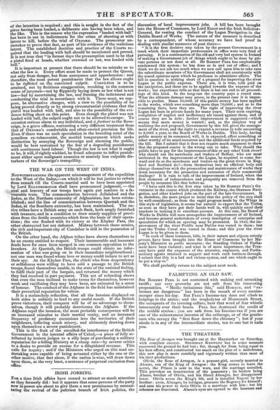IRISH JOBBING.
Fos a time Irish affairs have ceased to attract so much attention as they formerly did : but it appears that some persons of the party now in power are about to give them a new prominence by necessi- tating the revival of the paltriest branch of Irish . politics, the
discussion of local improvement jobs. A bill has been brought into the House of Commons, by Lord ELIOT and the Irish Solicitor- General, for vesting the conduct of the Lagan Navigation in the Dublin Board of Works. The nature of the measure is described by a correspondent, of whose accuracy we have had proof in dealing with similar measures of past times- " It is the first decisive step taken by the present Government in a track which their immediate predecessors in office were very fond of
pursuing. It is a continuation of the old and very bad system in Ireland
of making a Government job of things which ought to be done by pri- vate persons or not done at all. Sir ROBERT PEEL has emphatically
condemned this system : he has done so in and out of office ; and I think we do not ask too much when we now call upon him to take care the subordinate members of his Government shall act consistently with the sound opinions upon which be professes to administer affairs. The
bill in question is nothing short of a proposal for improving the river Lagan at the public expense. There are, it is true, tolls paid on the navigation, and these are to be applied towards the expense of the
works ; but experience tells us that there is but one end to all proceed- ings of this kind. In the long-run the country pays a round sum.
What the ultimate damage may prove, in the present case it is impos- sible to predict. Some 50,0001. of this public money has been applied to the works, which owe something more than 70,0001.; and as to the remaining facts, here they are. The right of improving the river Lagan has been in private hands for many years. Their term expiring, complaints of neglect and inefficiency are raised against them, and of course they are in debt ; further improvement is suggested—which means that more money is wanted ; and, as the simplest way of realizing the end proposed, Government by this bill gives the manap-
meet of the river, and the right to expend a revenue in tolls amounting to 2,0001. a year, to the Board of Works in Dublin. This body, having public money at its command, will, it is expected, effect something or other worthy of its usual resources and the additional funds acquired by the bill. But I submit that it does not require much argument to show that the proposed course is the wrong one to take. Why should the
public have to pay for the improvement of this or any other Irish river?
why should not the merchants and traders of Belfast, who are most interested in the improvement of the Lagan, be required to come for- ward and do as the merchants and traders on the great rivers in Eng- land and Scotland do?—form themselves into an efficient body and charge themselves with the prosecution and maintenance of works they deem necessary for the promotion and extension of their commercial dealings? It is vain to talk of the improvement of Ireland, when the first elements of independence and prosperity are removed from the people by measures like that before us.
" I have said this is the first step taken by Sir ROBERT PEEL'S Go venment in the course which produced the Railway, the Shannon Navi- gation, and other kindred jobs on the part of the late Government. It
is, therefore, the more proper to insist that the policy of the step shall be well-considered; as from the rapid progress made by the Whigs in this style of legislation, it seems but natural to expect that the Tories, as soon as they have got their hands well in, will quickly excel their teachers in turning it to excellent account. At this rate, the Board of Works in Dublin will soon monopolize the improvement of all Ireland, and become general undertakers of every description of enterprise and speculation for which an opening may be presented. In 1840, the im- provement of the river Poddle near Dublin was vested in them; last year the Tralee Canal was vested in them; and this year the river Lagan is to be given to them.
" In each of these instances, bills, in their nature and objects strictly private, have been brought into the House of Commons by her Ma-
jesty's Ministers as public measures ; the Standing Orders of Parlia- ment have been violated ; and what is of more importance, the Trea- sury have paid the expenses of the attornies, engineers, and Parlia-
mentary agents retained to support and work each business through. I submit that this is a had and vicious system, and one which ought to be put a stop to."
We shall probably return to the subject next week.


























 Previous page
Previous page